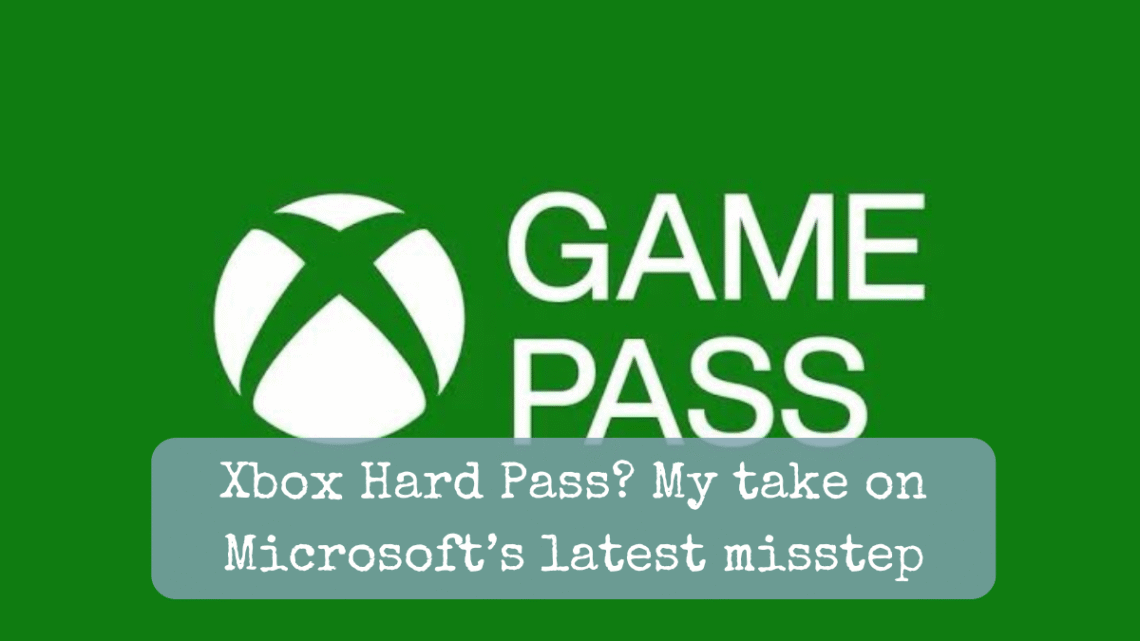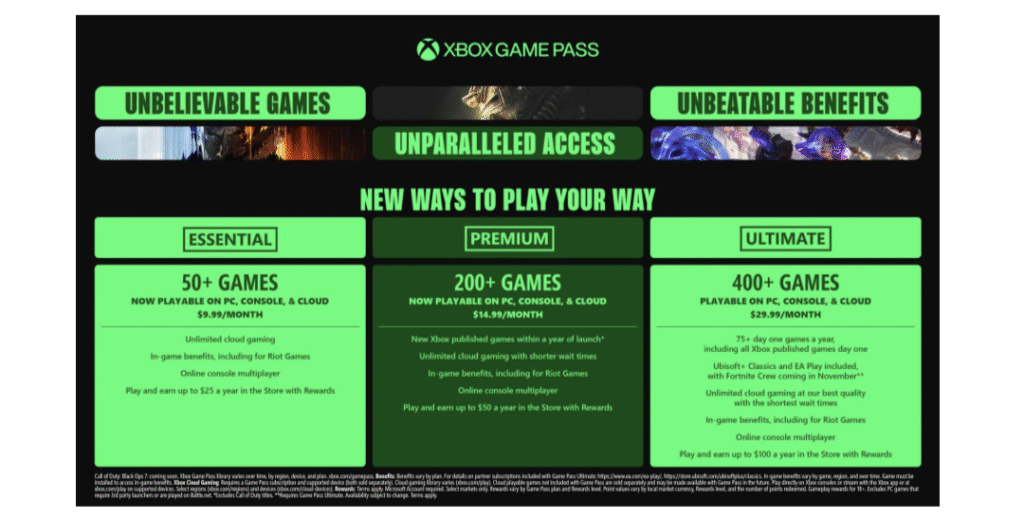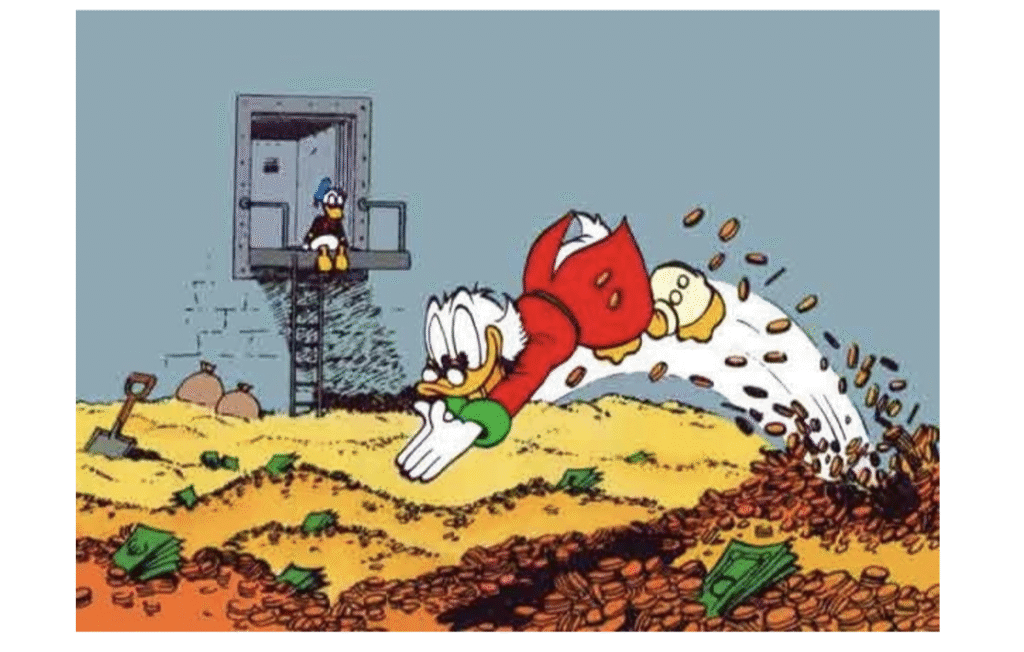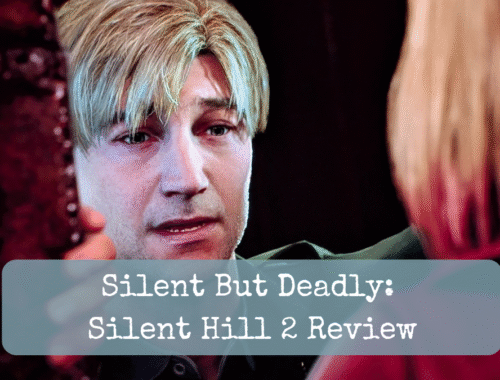
Xbox Hard Pass? My take on Microsoft’s latest misstep
What just happened?
As they rudely chose to announce just after we’d recorded October’s episode, Xbox ripped up the previous rules of its Game Pass subscription.
For understandable reasons, the headlines have all gone to the shocking price increase for Game Pass Ultimate, which has gone up around 50% in most regions. In the UK, that means Ultimate has gone from £15 (we’re not going to do pennies here) to £23 pm. And, as this follows a previous increase from £13 in July 2024, that make the increase nearly 80% over a 15 month period – which probably explains the vitriolic reaction that these changes have received.
Xbox attempted to either sell or disguise this by: upgrading the quality of the Cloud Gaming that’s included; adding the Ubisoft + Classics library that’s been part of PS Plus Extra for some time; promising even more (75!) Day One titles each year; and bundling a Fortnite Crew subscription into the service. Which re-positions Ultimate as a niche of a niche and seems to asssume that gamers interested in this tier must have either: unlimited time and some of the most diverse tastes in gaming; or enough disposable income and little enough financial discipline that they will grumble but ultimately pony up. It’s the latter one isn’t it?
One thing that’s attracted less attention is that Premium (which was previously known as Standard) has actually stayed the same price and had quite a lot added to it. At £11 per month, it now appears to offer weirdly “good value” which I suspect might be the real thing that’s going on here. It now includes cloud gaming, PC titles and an increased (though significantly smaller than Ultimate) library of games. But the kicker is that this tier does not include any new titles “Day One” (i.e. including brand new indie and AAA games in the service on the day that they are released) despite that being one of the main selling points of Game Pass across multiple showcases and for most, but not all, of its existence. They have tidied up the positioning with an firmer commitment that Xbox-published titles will come “within a year of launch” but there’s a clear and notable exclusion made for Call of Duty. It’s also unclear if, or when, non Xbox published Day One titles will arrive on this tier.
The Essential tier (formerly “Core”) now also includes Cloud Gaming and a small number of PC titles has stayed the same price too, at £7 per month. Despite the name, its main appeal is presumably still for Xbox gamers who want access to online multiplayer for the cheapest cost, and won’t sniff at a bonus game, two or catalogue of 50 being thrown in.

Interestingly, PC Game Pass has gone up 35% (from £10 to £13.50) but with no other changes being made. As well as never quite fitting into the Game Pass family (something which will only increase as Xbox pushes more into a PC/Console hybrid future) it’s now by far the most cost-effective way to play those Day One games. It’s also arguably the new “best deal in gaming” though Xbox seems much more shy to shout about this. All of which means its days are probably numbered.
Oh yes, and finally, just to twist the knife, Xbox has made some associated nerfs to the Microsoft Rewards programme and removed some of the discounts previously available to subscribers. Not content with the penny-pinching look from doing this, they also failed to communicate the discount changes at all. Sneaky? Incompetent? Who can really tell at this point.
What might people have missed?
Forgive me a little detour first but I will get to that.
Game Pass launched in 2017 but it really took off and built its identity once Xbox included Day One games, starting with Sea of Thieves in March 2018. So before Premium, before Standard even, there was just “Game Pass” a console-only tier that didn’t include Xbox Live Gold (so didn’t include online gaming) but did include Day One games. With the changes that Xbox keep making it feels like years ago though doesn’t it. Well, it was available and cost just £9 a month for new subscribers as recently as June 2024!
Since those changes last year, if you played on the Xbox console and wanted Day One titles you had to subscribe to Ultimate for £15 per month and you’d be paying a £4 per month differential over the Standard tier for that benefit. That’s a pretty minor difference for a central and highly-valued feature and it was a relatively easy upgrade to justify – particularly for anyone who had previously been paying for Xbox Live (for multiplayer) and Game Pass (for the library) anyway.
But fast forward just 15 months to the present day and that differential is now £12 – meaning that the “upgrade” fee for console gamers who want to keep Day One is now 200% larger. The monthly cost for the subscription that includes Day One games on console is now more than double the cost of the one that does not. Sure, it has some additional bells and whistles added but these will have no value for some (or, quite likely, many) existing Ultimate subscribers. Come to think of it – bells and whistles both actively annoy me so I’d probably pay to avoid them, but that’s maybe a little off topic.
So with that gap between Premium and “new” Ultimate, Premium suddenly seems like a good deal doesn’t it? Sure 200+ games isn’t 400+ but it’s a big number and probably more than most people will have time for. And who cares about 1440p Cloud streams and Fortnite Crew? Some people will but they are not exactly mass-market right? But, again, the big difference is Day One – and I wonder if that’s the point after all?
So what might really be going on?
The obvious answer is that Xbox, or probably Microsoft, is just trying to make more money. They’ve calculated that enough people will swallow the increase and stay that means total revenue still goes up. The maths isn’t too hard either is it? If the price has gone up 50% and less than a third of customers cancel then they are quids-in. It’s not going to help them grow their subscriber base or gain market share but ultimately “line still goes up” and shareholders still get to roll around in more money like the Scrooge McDucks that they presumably are. And that’s just if those people cancel outright. If, as is more likely, at least some of that third decide that Premium is now “good enough” for their purposes and they downgrade instead of cancelling, the economics (as opposed to the optics) of this do start to make sense.

So yes, money is usually the answer and that’s inevitably true here, but there were other ways to make that same money right? Spread odd some more gradual increases over all three tiers and over time? Money. Keep the “old” Ultimate plus a modest price hike and add whatever this super-mega-everything-bundled thing that they’ve come up with is on top? Money (I’d say God knows what they’d have called it but Xbox isn’t exactly shy of having non-sensical names). But no, they’ve very much chosen to put the cost all on Ultimate, to maintain the cost of the tier we now call Premium as the “affordable” options and to create this new, massive gap in-between. It forces current subscribers into a choice of effectively either upgrading or downgrading from the service they’ve had to date. There is no real “do nothing” option here, you are either in or actively “opting-out”.
Which brings me back to those Day One titles and my feeling that this is a short-term play for revenue and a longer-term play to get people “unhooked” from getting Day One games as part of their sub. That would be quite the change, especially given that since they were added in 2018, Day One has been a huge part of the Xbox marketing – not just for Game Pass but for why you’d choose this console or platform in general. But maybe, as Xbox finally hits their stride with a full pipeline of what they see as must-play games, and they sniff the money that has rolled in from selling on platforms like PlayStation, maybe they want to pivot and have found a sneaky way to do this without completely walking back on the Game Pass promise.
With fewer Ultimate subscribers (whether they’ve downgraded to Premium or cancelled entirely) Xbox now has more people who might buy, rather than access, Xbox published games Day One. At £60 it would take these “downgraders” buying an average of just under two and a half digital games a year for Xbox to still get more revenue from even this group (and for Ultimate to suddenly look appealing again to them as consumers). But when games go to £70 next year (and we know they are), that number becomes just over two. Deliver that and Xbox “wins” either way, at least in the short-term. Simply stop adding Day One games and everyone is mad and claiming betrayal. But give customers a choice between paying more or downgrading to what now seems like the value option (only to, probably, have them pay even more in the long term)? It’s greedy and bad news for Xbox gamers but it is kind of smart I guess – well, assuming they don’t completely alienate their customer base in the meantime.
My own view
Look, in case there was any doubt – I think that this all sucks.
Selfishly, in the short term, I am weirdly unaffected – having stacked my membership and pre-paid all the way through until December 2027. Through various freebies (thank you X019 goody bag), discounts and by milking the previous, more generous, Microsoft Reward program, I also calculate that I’ve paid about £6 a month on average over that time – so I’m a combination of lucky and a planner and am grateful for both. But in due course, I’ll need to make the same decision that millions of current subscribers are making this month. And there’s a big difference between being able to afford it and being able to justify it.
Most likely I’ll do what I now do with streaming services like Netflix, move to dipping in and out of Ultimate – cherry picking the months when there’s something I want to play and I have the time to play it. Because, while questionable decisions and rubbish comms have become a company tradition for Xbox, 2025 feels different to before. Until recently, Xbox tended to give us the sort of face-palm-inducing, bumbling incompetence that you’d expect more from a Hugh Grant character than a trillion dollar company. But recently their behaviour has been more akin to the moustache-twirling, money-counting, job-cutting pantomime villainy that you’d absolutely expect from a trillion dollar company. Just not necessarily one which remains firmly in third place in an arguably two-horse race.

What’s baffling still is that Xbox spent 10 years earning back what little goodwill they could and building something unique and valued (in Game Pass) only to then torch it in the following two. Previously, their setbacks were followed by row-backs but this time there is no sign of Xbox climbing down, despite an absolutely furious reaction. Perhaps the “I told you so”s who claimed Game Pass was unsustainable were simply right all along and the chickens have come home to roost? Perhaps the $69bn acquisition of Activision Blizzard King changed the game, or at least the financial calculations? Or perhaps Lina Khan and the FTC were actually right and what we now see is simply a corporation doing what corporations do when they get too comfortable – looking to bleed their customers dry.
Still, if those customers show enough price elasticity and stick with Game Pass through gritted teeth, the economics of all this might be sound – even if the current outlook looks bleak. But what if they do what I’m planning to do and just start dipping in and out? What if they just throw their hands up and go elsewhere like so many have done already? Without a compelling Game Pass, it does now feel fair to ask what’s the point of a modern Xbox when you can buy Xbox games and any PlayStation exclusives over on that platform? I, personally, am completely sold on Xbox’s rumoured pitch for an open, hybrid, PC/Console next-generation machine – though that’s a conversation for another time. But after this terrible price hike and the current sentiment, Xbox needs to remember that consoles still need customers. And customers can or will only pay so much.
My only (realistic) suggestion?
In closing, I’m not sure there’s any way to save face or goodwill here. Even were Xbox to completely row back the price increase on Ultimate, fans will be rightly wary of the next time and ask when, not if it will happen again. And I really don’t see a roll-back or even some kind of compromise price being offered given that those contracts with Epic, Ubisoft and whoever is topping up those Day One games to 75 a year have been signed and won’t have been cheap.
But there is a way that I think Xbox could acknowledge their screw up, save fans a little cash against the new status quo and potentially help avoid subscribers from cherry picking the best months of a year. They should bring back an annual subscription option (solely for Ultimate if you must) which would allow them to lock in retention on that higher tier. Pricing this at 12 months for the price of 9 would be the dream, with a 6 for the price of 5 half-year option too ideally. But 12 months for the price of 10 feels more realistic and would still drop the effective monthly price for annual members to just under that psychological £20 mark. And if they would also finally launch some kind of family pass option too that would be even better. Wishful thinking? Perhaps, but “gaming is for everyone” after all, not just those with the biggest wallets. And when everyone can afford to play, we all win.

Magic Mansion: Blue Prince Review
You May Also Like

Ratchet & Clank: Rift Apart
August 25, 2024
I Miss Blue Prince
July 3, 2025